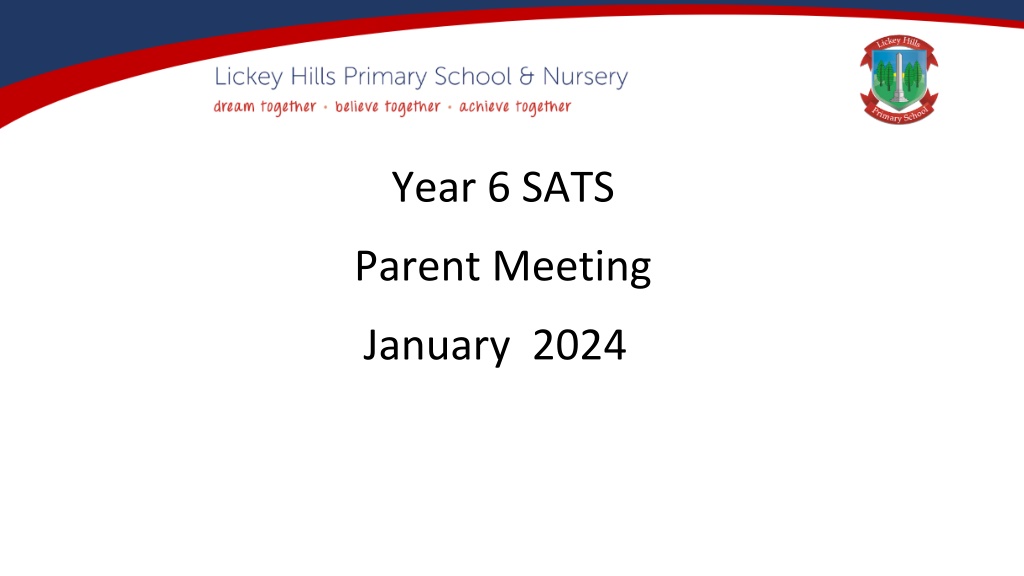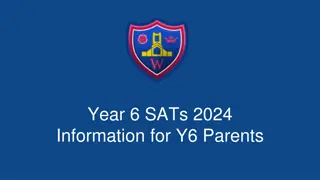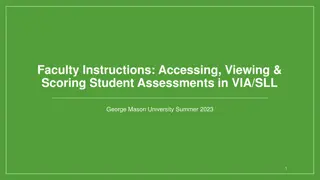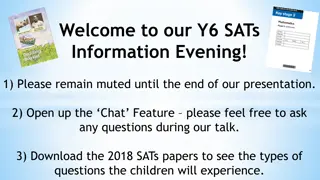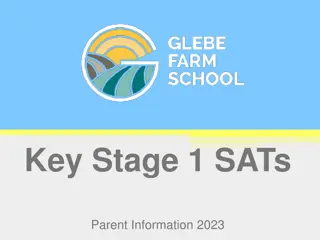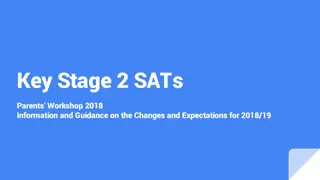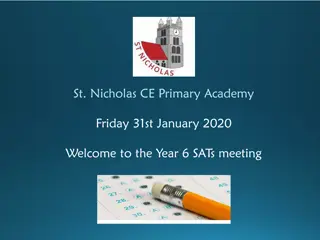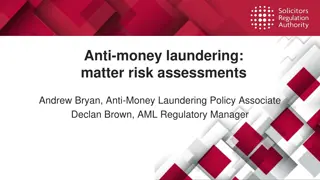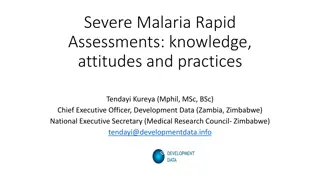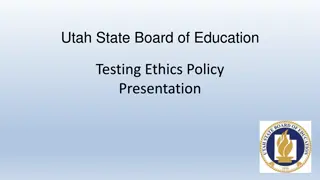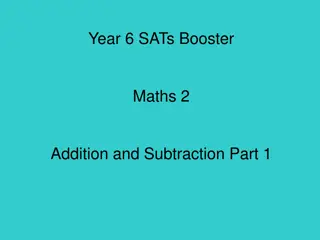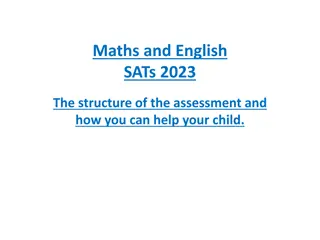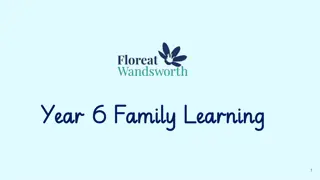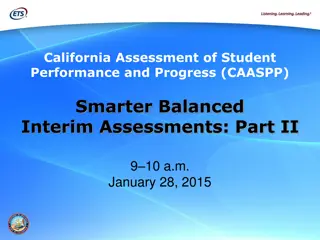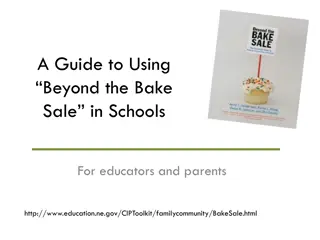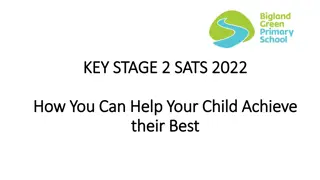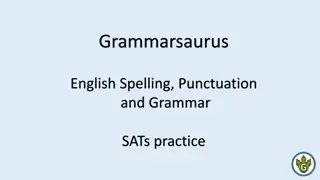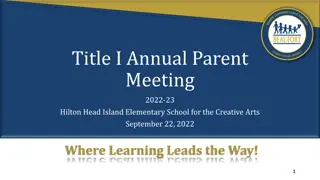Year 6 SATs: A Parent's Guide to Key Stage 2 Assessments
Year 6 SATs are Standard Assessment Tests held at the end of Key Stage 2 in the UK, covering Reading, SPAG, and Maths. These tests take place in May over four days, with specific access arrangements for students with additional needs. Results are reported through raw scores, scaled scores, and judgments on meeting the National Standard. Parents can support their children by understanding the SATs process and helping at home.
Download Presentation

Please find below an Image/Link to download the presentation.
The content on the website is provided AS IS for your information and personal use only. It may not be sold, licensed, or shared on other websites without obtaining consent from the author.If you encounter any issues during the download, it is possible that the publisher has removed the file from their server.
You are allowed to download the files provided on this website for personal or commercial use, subject to the condition that they are used lawfully. All files are the property of their respective owners.
The content on the website is provided AS IS for your information and personal use only. It may not be sold, licensed, or shared on other websites without obtaining consent from the author.
E N D
Presentation Transcript
Year 6 SATS Parent Meeting January 2024
Aims: What are SATs? When do they take place? How do they take place? Are there specific access arrangements for pupils with additional needs? How are results reported? Examples of questions from SATS papers How can parents help at home?
What are the SATs? SATs stands for Standard Assessment Tests and is an acronym used to refer to the end of Key Stage 2 national assessments which take place across the UK in May every year. The tests last for four days beginning on Monday 13th May 2024 ending on Thursday 16thMay 2024. The tests are in Reading, SPAG and Maths. There is no test in writing. Writing is assessed using evidence collected by your child s teacher throughout Year 6.
How are the SATs carried out? The tests will take place during normal school hours, under exam conditions across the four Y5 and Y6 classrooms. Children are not allowed to talk to each other from the moment the assessments are handed out, until they are collected after the test has ended. Afterwards, the completed papers are sent away to be marked externally. The children s results are sent back to school in July and will be reported to parents and carers as soon as they are ready.
Specific arrangements for SATs: Children with additional needs, who have similar provision in their day-to-day learning at school, may be allotted specific arrangements, including: 25% Additional (extra) time Tests being opened early to be modified An adult to read for them An adult to scribe (write) for them Written or spoken translations of the mathematics reasoning papers The use of prompts or rest breaks Arrangements for children who are ill or injured at the time of the tests We will begin the process of organising specific access arrangements for our pupils and will be in touch with parents of children who we will be applying for in the coming weeks.
What sort of results are reported? Once marked, the tests will be given the following scores: A raw score (the total number of marks achieved for each paper) A scaled score (which is explained below) A judgement of whether the National Standard has been met. After marking each test, the external markers will convert each raw score into a scaled score to show whether each child is working below, at or above the national standard. Scaled scores change each year depending on the difficulty experienced nationally of the papers that year. When the scaled score is given, it is given in a range from 80 to 120. A scaled score of 100 or more is meeting the national standard. There are no separate tests for higher achieving pupils; however, a scaled score of 110 - 120 would show that a child is working above the national standard known as working at greater depth.
Example of a previous Maths scaled score conversion table
Grammar, Punctuation and Spelling Grammar, Punctuation and Spelling is made up of two papers which will take place on Monday 13thMay 2024. Paper 1 is the longer paper lasting 45 minutes, children will be tested on grammar and punctuation and spelling generally. Paper 2 is a shorter paper lasting approx 15 minutes, where children will be tested on spelling only they are asked to fill in the blank word within a sentence, so they are given the context of the meaning of the word. The papers are out of 70 (50 marks for paper 1 and 20 marks for paper 2).
Grammar, Punctuation and Spelling (Paper 1) Monday 13ththMay 2024 Grammar, Punctuation and Spelling (Paper 1), which is 45 mins, focuses on the following areas: - Grammatical - Functions - Combining words, - Verb forms, - - - Standard English and formality terms/word of phrases tenses classes sentences clauses consistency Punctuation Vocabulary and and The children have been practicing all of the above daily in all English lessons throughout their time in school. In one form or another we have been preparing and equipping the children right from year 1 with a good knowledge of the technical vocabulary needed to identify and describe various aspects of grammar and punctuation marks. Grammar, Punctuation and Spelling (Paper 1) requires a range of answer types such as circling missing capital letters, multiple choice questions, one-word answers, but does not require longer formal answers. There are 50 questions in total, each worth 1 mark.
Grammar, Punctuation and Spelling (Paper 1) Example questions:
Grammar, Punctuation and Spelling (Paper 2) Monday 13th May 2023 This is the shorter paper lasting 15 minutes. There will be 20 spellings, each worth 1 mark. Example questions:
Grammar and Punctuation Content/ Spelling Rules: Spelling: https://assets.publishing.service.gov.uk/government/uploads/system/uploads/attachmen t_data/file/239784/English_Appendix_1_-_Spelling.pdf Grammar: https://assets.publishing.service.gov.uk/government/uploads/system/uploads/attachmen t_data/file/335190/English_Appendix_2_-_Vocabulary_grammar_and_punctuation.pdf
Reading The The assessment has been designed to measure whether children s comprehension of age-appropriate reading material meets the national standard. It a standard timing of 60 minutes, including reading the texts and answering questions. There are three different set texts for the children to read, which could be any combination of non-fiction, fiction and/or poetry. Year 6 Reading SATs paper will be sat on Tuesday 14th May 2024 The 2a) 2b) 2c) 2d) 2e) 2f) 2g) 2h) make comparisons within the text. Reading paper focuses on the meaning following areas of details more inferences known words from as Content in and one from and Domains: context; non-fiction; paragraph; the implied; a whole; phrases; give/explain the retrieve and record main from what how how information/identify ideas text/explain might information/content meaning key fiction summarise inferences predict identify/explain identify/explain from than with make the and justify from evidence stated meaning of text; happen is details contributes choice related and through to as is enhanced words and The Year 6 Reading SATs paper requires a range of answering styles, including responding to multiple choice questions, one- word answers, and multiple mark questions which require more formal paragraph-length answers.
Example question, based on Text 3 The Lost World: 2e) predict what might happen from details stated and implied
Reading Since the current testing format for the Year 6 SATs began in 2016, there has been a tendency for the number of marks to go in favour towards three particular types of content domain / questions. For example, in 2019: - 20% of marks could be gained by answering questions where children had to give/explain the meaning of words in context (Content Domain 2a); - Over a quarter of marks could be gained by answering questions where children had to retrieve/record information or details from the texts (2b); - Almost half of the marks were allotted to questions requiring children to make inferences from a text, justifying inferences with text evidence (2d). So, when reading with your child at home, try asking questions like: Find a word in this paragraph that is closest in meaning to provide word e.g. annoyed (2a); In what year did provide fact e.g. the French authorities make it illegal for people to swim from France to England ? (2b); In the last paragraph, X does not want to Y. Give two reasons why X does not want Y. (2d) What impression do you get of this character? Give evidence from the text to support your answer. Reading a variety of text-types at home will prepare your children for the texts they might encounter in the SATs.
Maths Paper 1 (Arithmetic) Maths Paper 1 (Arithmetic) will take place on Wednesday 15th May 2024. It has a standard timing of 30 minutes and is worth a total of 40 marks. It covers the four operations (division, multiplication, addition, subtraction and mixed operation calculations requiring BIDMAS), as well as number properties, calculating percentages of amounts, calculations using decimals, and calculations using fractions. Example questions:
Maths Papers 2 & 3 (Reasoning) Maths Paper 2 (Reasoning) will take place on Wednesday 15th May 2024. Maths Paper 3 (Reasoning) is scheduled for Thursday 16th May 2024. Both have standard timings of 40 minutes and are worth 35 marks each. Paper 2 and 3 requires children to demonstrate their mathematical knowledge and skills, as well as their ability to solve problems and their mathematical reasoning. Questions focus on the following Mathematical topic areas: - Number and place value including Roman Numerals; - Addition, subtraction, multiplication and division (calculations); - Geometry properties of shapes; - Geometry position and direction; - Statistics; - Measurement including length, perimeter, mass (weight), volume, time and money; - Algebra; - Ratio and proportion; - Fractions, decimals and percentages. The questions get harder throughout the paper. It is not unusual for a child to be unable to complete the entire paper in time.
How can I support my child in preparing for their SATs? Firstly, a positive attitude goes a long way so as much encouragement and support as possible. We only ever encourage children to try their best. SATS Club - We will be inviting children to join our SATS clubs throughout March, April and May and these will be after school on a Thursday until 4.15. Letters will be sent out closer to the time. SATS Breakfast Club - A breakfast club will run each morning of SATS week. We invite children to arrive into school at 8.15am and will be able to enjoy a slice of toast with a glass of fresh juice, this will not only provide important brain food, but it will ensure that every child will be in school in plenty of time before the SATS begin and will no doubt help to ensure that the children are more relaxed with the day ahead. There will be no cost for this to parents. We would like to ask you to please ensure that your child gets lots of rest and sleep during SATS week and that they are equipped with healthy snacks and a water bottle every day for their break times. We encourage our pupils to take the opportunity to revise over the Easter break. All pupils have SATS folders, full of excellent revision material. The pupils will also be given test papers to complete over the holiday as home learning. English: Vocabulary and Comprehension Ninja Books CPG Revision Listen to your child reading to you and question them. Maths: https://mathsbot.com/primary/ks2 - online arithmetic paper that generates endless SATS questions and marks answers for you! Lots of other useful practise resources on the Y6 webpage (click the SATS resources link).
Would you like to order SATs 2023 Practice Books ? We are pleased to be able to offer school bundle prices for SATs practice books. This year the offer is for a Complete KS2 Maths and English 10 minute test SAT Buster Book 1 Bundle . The bundle contains 3 books; Maths. Reading and SPAG (grammar, punctuation and spelling) and answers for all. The bundle is 6.50 half the price in bookshops - 14.00. The code for this Bundle is TBC. You can place your order via the Arbor app. The closing date is 12.00 noon 3rd February. We shall be in touch again soon with letters regarding the access arrangements for some of our pupils and the upcoming SATS clubs next term. Thank you once again. Mrs Page, Miss Williams and Miss Smith.
Thank you very much for listening, if there are any questions please do not hesitate to get in touch
